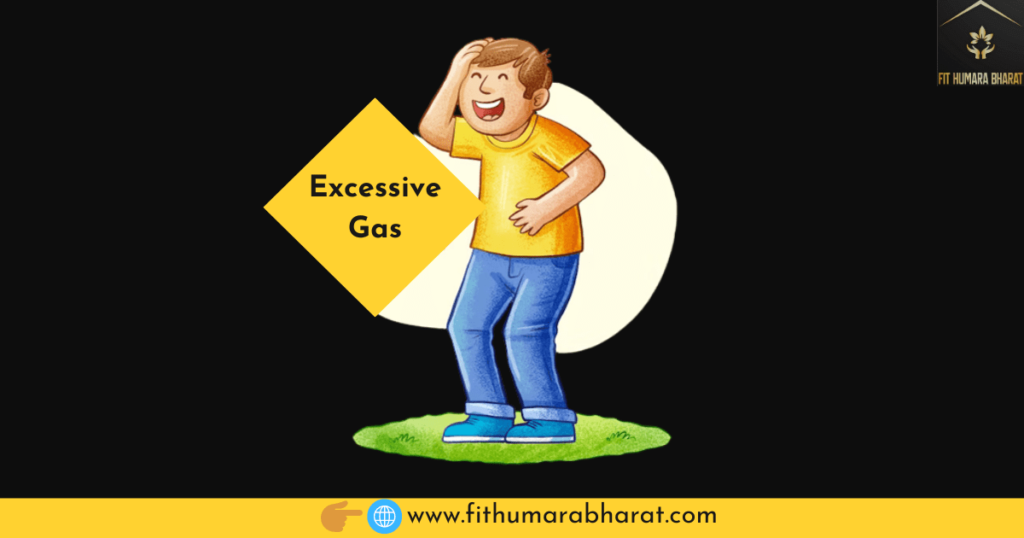The normal physical function of farting, sometimes referred to as flatulence, takes place when an excessive amount of gas has accumulated in the digestive system and has to be released from the body.
- On average, a person passes gas (farts) about 5 to 15 times per day.
- The volume of gas expelled per flatulence event can range from 30 to 150 milliliters.
Ayurveda, which is an ancient Indian medical system, offers helpful insights into the factors that lead to excessive flatulence as well as natural treatments that can reduce the symptoms of this widespread health problem. We will investigate the myriad of factors that might lead to excessive flatulence and go into the Ayurvedic remedies that can help provide relief.

1. Problems Digesting Food:
According to Ayurvedic theory, improper digestion is one of the fundamental causes of excessive gas. In the digestive tract, fermentation can occur if food is not effectively digested, which can result in gas production. Eating too rapidly, overeating, or ingesting meals that are dense and difficult to digest can all contribute to this issue to varying degrees.
As per study, it is supposed to affects approximately 10-15% of people worldwide and is associated with symptoms like abdominal pain, bloating, and changes in bowel habits, including excessive gas.
Ayurvedic Solution In order to facilitate better digestion, Ayurveda suggests adding spices such as ginger, cumin, and fennel to the foods you eat on a regular basis. These spices are digestive aids that also aid in preventing excess gas from forming in the body. In addition, it might be helpful for digestion to practice mindful eating and to consume meals that are both smaller and well-cooked.
2. Your Choices in Food:
It is common knowledge that the digestion of certain meals results in the production of greater gas. Some foods, such as beans and lentils, broccoli and cabbage, as well as carbonated beverages, have been linked to an increase in flatulence.
Ayurvedic Solution: Ayurveda recommends boiling beans and lentils with digestive spices such as asafoetida (hing) and adding digestive herbs such as ajwain (carom seeds) to your meals in order to reduce the amount of gas that is caused by dietary sources. In addition to that, you should aim to limit the amount of gas-producing items that you consume.
3. Food Allergies and Intolerances:
Excessive gas can be a symptom of food allergies or intolerances, the most common of which are sensitivity to gluten and lactose. Gas and bloating might be the result of the body being unable to adequately digest certain components of the food that it eats.
Lactose intolerance is estimated to affect up to 70% of the world’s population to some degree.
The solution offered by Ayurveda is to determine which foods cause allergic reactions or intolerances and then to steer clear of such foods. In addition to this, include anti-inflammatory herbs in your diet. You can choose turmeric and ghee (butter that has been clarified) as a cooking medium. It will assist to calm the digestive tract.
4. An Unbalanced Vata, Pitta, or Kapha Dosha:
Ayurveda classifies everyone as having one of three distinct body types, or doshas: vata, pitta, or kapha. Digestive issues and flatulence might be the result of an imbalance in the dosha that is prominent in your body. For instance, an overabundance of vata dosha might lead to symptoms such as bloating and gas.
It is crucial to Ayurveda that you strike a balance between your doshas through dietary choices, lifestyle choices, and the use of herbal treatments. Consume meals that are warm and nutritious, stay away from foods that are cold or raw. Engage in grounding activities like yoga and meditation to help correct a vata imbalance.
5. Mental and emotional issues
These issues can have a big influence on digestive health. Stress and anxiety are two examples. The normal digestion process can be thrown off by worry and stress, which can result in uncomfortable gas and bloating.
Solution from Ayurveda Ayurveda places an emphasis on stress reduction via the practise of activities such as yoga, meditation, and deep breathing. Adaptogens found in herbs, such as ashwagandha and Brahmi. It can also assist in the management of stress and the promotion of intestinal harmony.
6. Insufficient Agni (Digestive Fire):
Ayurveda places a significant amount of emphasis on having a robust digestive fire. It also known as Agni, in order to metabolise food in an effective manner. If Agni is not strong enough, food could not be adequately digested, which can result in bloating and gas.
Solution from Ayurveda According to Ayurveda, if you want to enhance Agni, you should consume a tiny piece of fresh ginger with a sprinkle of salt before to each meal. Consuming warm water that has been infused with lemon can also help increase Agni and assist digestion.
unusual eating patterns, such as missing meals or eating at unusual times, can disrupt the digestive process and contribute to gas.
7. Irregular Eating Habits:
Solution according to Ayurveda Ayurveda recommends regular meal times and the intake of freshly prepared, warm meals. A healthy digestive system can also be supported by avoiding meals and snacks late at night.
8. Consuming an Excessive Amount of Antibiotics and drugs:
Consuming an excessive amount of antibiotics and certain drugs can upset the balance of good bacteria in the stomach. It can lead to digestive difficulties and flatulence.
The Ayurvedic solution is to eat foods that are high in probiotics. Such as yoghurt and fermented vegetables, in order to improve the health of your digestive tract. The digestive tract may also be cleansed and brought back into equilibrium by using herbal treatments like triphala.
9. Dehydration:
If you do not drink enough water during the day, you may experience constipation and sluggish digestion. Both of that can contribute to bloating and gas.
Solution from Ayurveda Ayurveda places a strong emphasis on maintaining sufficient hydration, with water. It is either warm or at room temperature being the beverage of choice. Teas made from herbs such as licorice and fennel can also be beneficial for digestion and keeping the body hydrated.
10. A Lifestyle That Is Relatively Sedentary:
A lack of physical exercise can cause the digestive process to slow down, which can result in bloating and gas.
The Ayurvedic remedy for this issue is to engage in some form of consistent physical exercise throughout the day, such as walking or yoga. This will assist to stimulate digestion and minimise gas.
Thank You
- Symptoms & Causes of Gas in the Digestive Tract
- How can I reduce or prevent excess gas or gas symptoms?
- Eating, Diet, & Nutrition for Gas in the Digestive Tract
- How can I reduce or prevent excess gas or gas symptoms?
- Definition & Facts for Gas in the Digestive Tract




 Sources
Sources